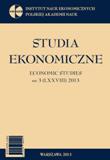Średniowieczni islamscy uczeni nieznanymi prekursorami współczesnej ekonomii?
Are Medieval Islamic Scholars Unknown Precursors of Modern Economics?
Author(s): Arkadiusz SierońSubject(s): Economy
Published by: Instytut Nauk Ekonomicznych Polskiej Akademii Nauk
Keywords: medieval Islamic scholars; medieval Islamic economic thought; precursors of modern economics; scholastic economics; Salamanca School
Summary/Abstract: The aim of this paper is to revise the mainstream view of the history of economic thought, according to which nothing of relevance to economics was conceived and written anywhere in the world between the fall of ancient civilizations and the development of scholasticism initiated by St. Thomas Aquinas. To verify the limits of the “Great Gap” thesis, we examine the economic thought of three selected Islamic scholars: Al-Ghazali, Nasir Tusi and Ibn Khaldun. On the basis of this analysis, we claim that Islamic scholars were sophisticated economic thinkers, who made many insightful remarks, often anticipating later economists. Therefore, we suggest that Islamic scholars could affect scholastic thinkers – most likely those from the Salamanca School, since the influence of Islam in medieval Europe was strongest in Spain – and therefore may be unknown forerunners of modern economics.
Journal: Studia Ekonomiczne
- Issue Year: 2013
- Issue No: 3
- Page Range: 441-455
- Page Count: 15
- Language: Polish

